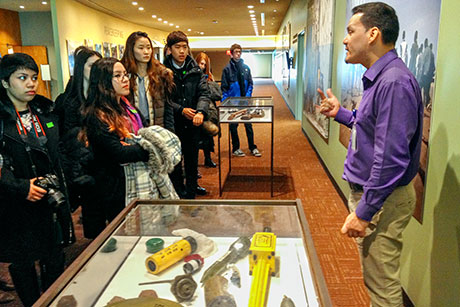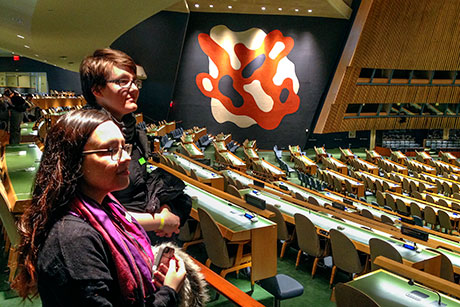UN officials brief Cornell students on new global tasks
By Blaine Friedlander


UNITED NATIONS — In a short, exclusive symposium designed for Cornell students Feb. 20, officials from the United Nations detailed a new 15-year initiative on battling climate change worldwide.
“It’s a very natural thing for the United Nations to work on,” Daniel Thomas, of the U.N. Secretary-General’s Climate Change Support Team, told the Cornell group. “Climate change crosses all borders and all nations. This is an urgent issue. This is a long-term challenge.”
United Nations speakers and guides discussed the original eight Millennium Development Goals that started in 2000. Fifteen years later, seven of the eight goals – eradicating hunger, strengthening primary education, gender equality, reducing child mortality, improving maternal health, combating disease and global development – were generally met. However, effective environmental sustainability for all countries remained elusive, and the U.N. now will emphasize the reduction of climate change until 2030.
The Cornell students also heard from Nuria Felipe Soria, a communications specialist with UN Women, who provided an update on gender equality and empowerment of international women’s issues. Mattias Klettermeyer, of the U.N. Department of Social and Economic Development, explained the “Post 2015” Millennium Goals agenda; and David Michael Kelly, from the U.N. Office for the Coordination of Humanitarian Affairs, gave a current affairs overview.
About 86 undergraduates, graduate students and academic fellows toured the United Nations. The Cornell group reflected a wide array of cultures from 29 different countries, ranging from Brazil to Ghana, from Costa Rica to Ethiopia and Korea.
This 11th annual trip to the U.N. was organized by N'Dri Assié-Lumumba, professor of African/Diaspora education at the Africana Studies and Research Center in the College of Arts and Sciences; and Theoria Cason, the resident hall director of Ujamaa. “Its purpose is to inspire and provide an opportunity for students to appreciate a diverse and complex world with a shared humanity,” Assié-Lumumba said.
Peruvian Miguel Ladera, a U.N. public affairs officer, led one tour of Cornell student groups. He explained the U.N. Security Council, General Assembly, peacekeeping efforts, disarmament programs, human rights, as well as economic and social councils.
Reflecting on the trip, Sia Kwimbere ’18, who hails from Tanzania, was heartened that the U.N. will continue addressing learning and literacy around the world. “There needs to be more quality primary education – we need universal primary education,” she said.
Media Contact
Get Cornell news delivered right to your inbox.
Subscribe